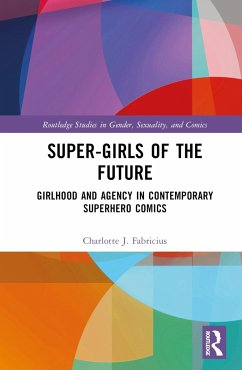Super-Girls of the Future: Girlhood and Agency in Contemporary Superhero Comics investigates girl superheroes published by DC and Marvel Comics in the first two decades of the twenty-first century, asking who the new-and-improved super-girls are and what potentials they hold for imagining girls as agents of change, in the genre as well as its socio-cultural context.
As super-girls have grown increasingly numerous and diverse since the turn of the millennium, they provide an opportunity for reconsidering representations of gender and power in the superhero genre. This book offers the term agentic embodiment as an analytical tool for critiquing the body politics of superhero comics, particularly concerning youth, femininity, whiteness, and violence. Grounded in comics studies and informed by feminist cultural studies, the book contributes a critical and hopeful perspective on the diversification of a genre often written off as irredeemably conservative and patriarchal.
Super-Girls of the Future is a key title for students and scholars of comics studies, visual culture, US popular culture, and feminist criticism.
As super-girls have grown increasingly numerous and diverse since the turn of the millennium, they provide an opportunity for reconsidering representations of gender and power in the superhero genre. This book offers the term agentic embodiment as an analytical tool for critiquing the body politics of superhero comics, particularly concerning youth, femininity, whiteness, and violence. Grounded in comics studies and informed by feminist cultural studies, the book contributes a critical and hopeful perspective on the diversification of a genre often written off as irredeemably conservative and patriarchal.
Super-Girls of the Future is a key title for students and scholars of comics studies, visual culture, US popular culture, and feminist criticism.
Treating superheroes with nuance is no easy task, but Fabricius does so with style. As major comics publishers finally try to take girls seriously, Fabricius asks to what extent these fictional girls can help us engage with the differences that weave through real life. But hers is not a simple cataloguing of successes and failures; Super-Girls of the Future rethinks how empowered girls stretch our ideas of what counts as diversity and what communities-and solitudes-girls will have to embrace. In thinking through meanings and uses of representation, Super-Girls of the Future helps us navigate the path to the best future for our own super-girls to champion.
Joe Sutliff Sanders, University of Cambridge, UK
"This book breaks new ground in spectacular fashion while being thoroughly grounded in existing research. It goes beyond positive and negative models of evaluating issues of representation in favour of nuanced, formally adept, and innovative discussion of webs of industrial and artistic conflicts. In this respect, it is positioned at the forefront of important and provocative research in this area."
Anna F. Peppard, editor of Supersex: Sexuality, Fantasy, and the Superhero
Joe Sutliff Sanders, University of Cambridge, UK
"This book breaks new ground in spectacular fashion while being thoroughly grounded in existing research. It goes beyond positive and negative models of evaluating issues of representation in favour of nuanced, formally adept, and innovative discussion of webs of industrial and artistic conflicts. In this respect, it is positioned at the forefront of important and provocative research in this area."
Anna F. Peppard, editor of Supersex: Sexuality, Fantasy, and the Superhero








